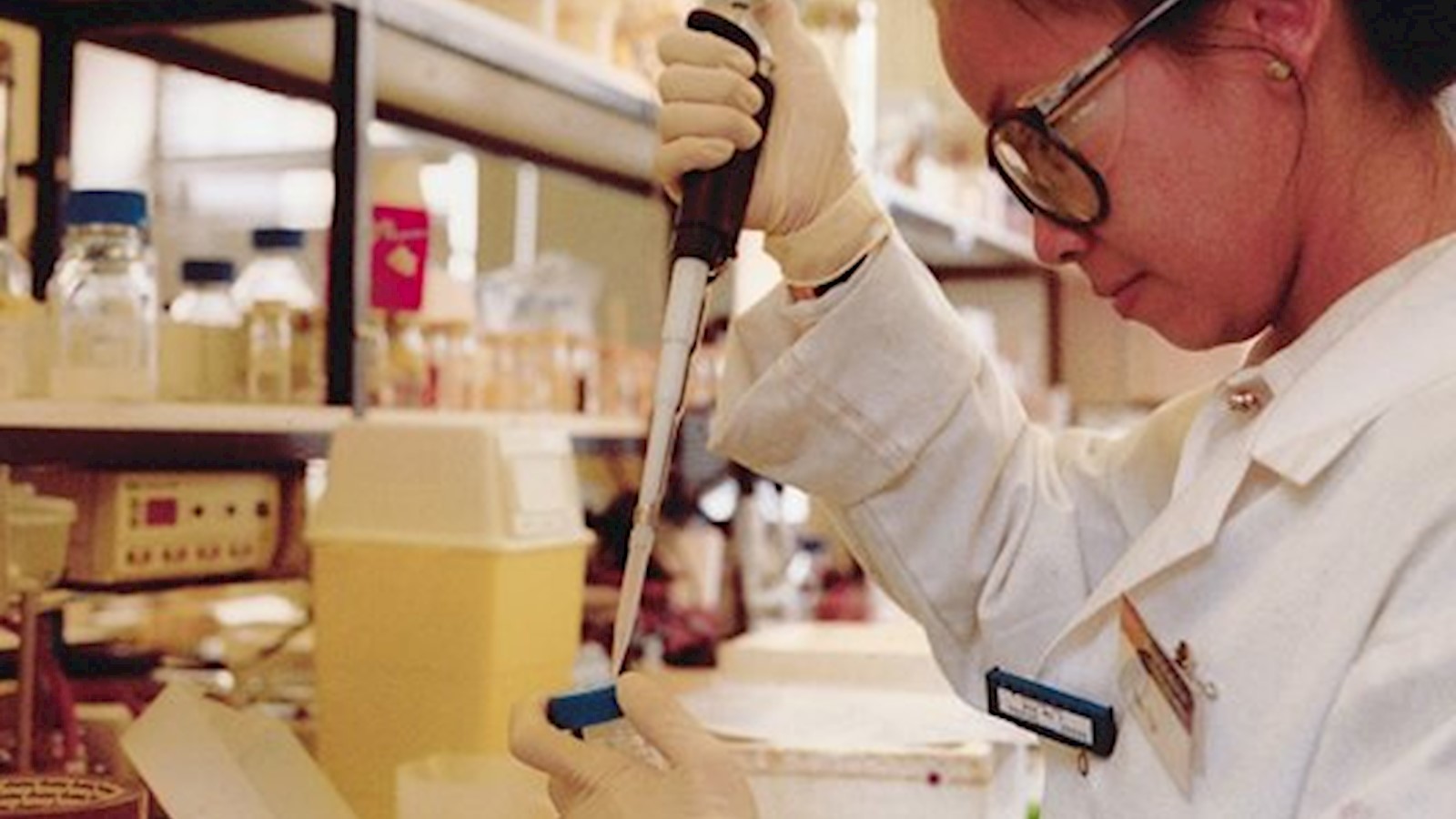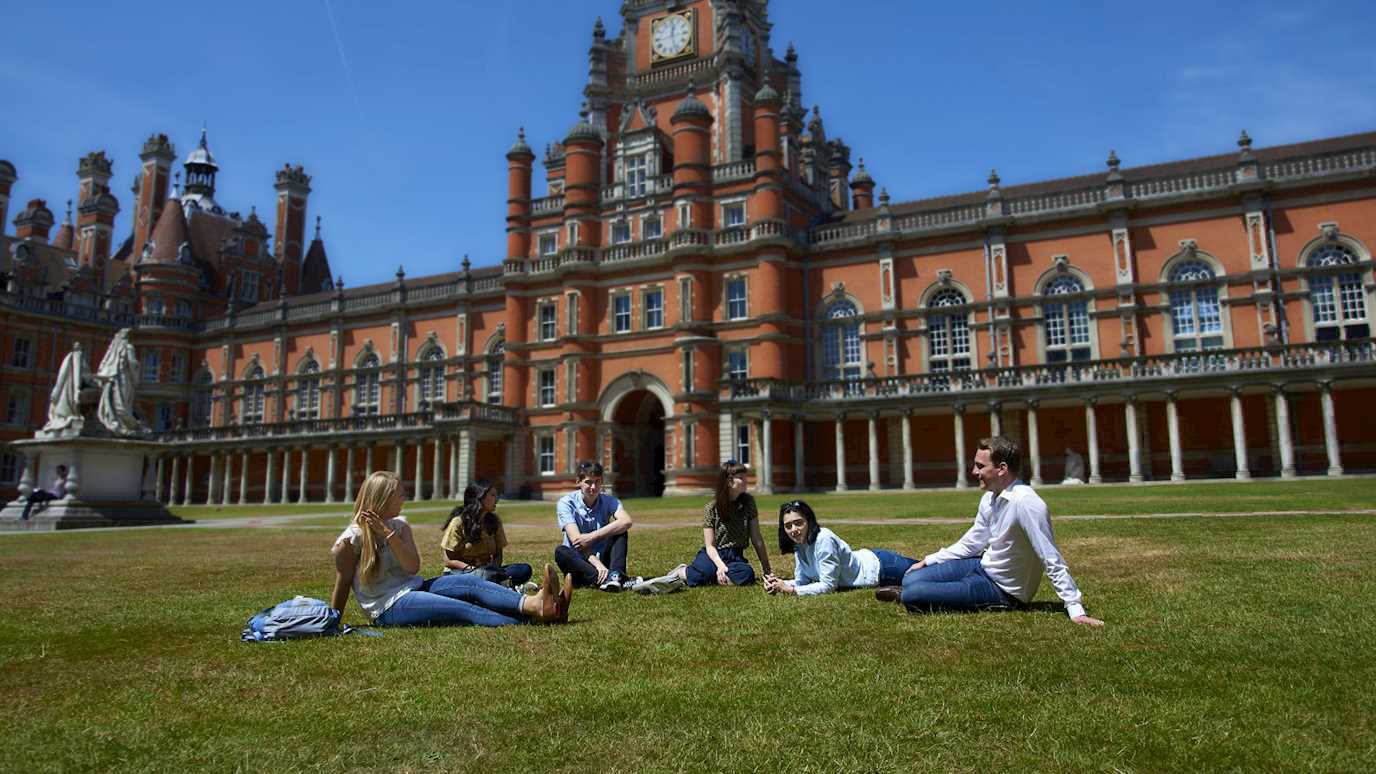Course options
Key information
Duration: 4 years full time
UCAS code: C10F
Institution code: R72
Campus: Egham
The course
BSc Biology with Integrated Foundation Year
Our Integrated Foundation Year for science is a thorough, skills-building course that will give you everything you need to start your study of BSc Biology with confidence.
Science underpins society and can help us provide answers to fundamental questions. Our Foundation Year sets you up so that you’re ready to take on those questions - providing you with opportunities to gain knowledge and understanding of how to get started in studying the sciences at university, including Biology.
Once you have completed your Foundation year, you will normally progress onto the full degree course, BSc Biology. There may also be flexibility to move onto a degree in another department (see end of section, below).
Biology helps us to understand the world around us – the way that plants and animals interact, the way that different living things evolve and adapt and our own role in the wider natural world. Biology at Royal Holloway, University of London gives you a sound understanding of the structure, function, evolution and diversity of living organisms and the interactions between them.
On BSc Biology you will study a diverse range of biology modules, from molecular biology to learning the science to help overcome the challenges of climate change. You can choose a pathway to tailor your degree to your own biological interests from a huge range of options taught by experts in their fields, across the spectrum of ecology or molecular sciences. This degree is accredited by the Royal Society of Biology.
You will learn on a biodiverse campus in reach of sites of special scientific interest and put your learning into practice through fieldwork opportunities. You will develop an understanding of how to design and analyse experiments and gain invaluable laboratory experience and data handling skills.
On successful completion, you’ll be equipped with:
- a broad understanding of the fundamental knowledge base and the terminology of Biological Sciences
- an awareness of current areas of debate and discovery in Biological Sciences and how scientific knowledge and methods can be applied to investigate them.
- the skills needed to work in a wide range of sectors.
From time to time, we make changes to our courses to improve the student and learning experience. If we make a significant change to your chosen course, we’ll let you know as soon as possible.
Course structure
Core Modules
Foundation Year
-
Global and Planetary Health is built around global issues. Each topic will embody issues of global importance and be based on authentic and topical world events.
The module is intended to deliver an interdisciplinary, academically authentic introduction to global issues, which satisfies a wide range of interests appealing to students wanting to progress onto a range of life science subjects. Therefore, readings and lectures will approach the topics from a life sciences perspective. Topics covered are likely to include Virtual reality, Health apps, Internet of medical things, Mental Health, Climate catastrophe, Global biodiversity crisis, Technology for monitoring the environment and The ‘One Health’ approach. The module also aims to help students develop their study skills to succeed on the Integrated Foundation Programme and as undergraduates. It introduces students to thinking and reading critically. It explains what it means to be 'critical'. The module also focuses on writing, teaching students about the writing process, how to find and review literature, how to build an argument in essays, how to use academic English, and how to cite and reference to avoid plagiarism. Finally, it offers practical advice on planning study work, becoming more organised, and finding further guidance if needed.
-
Students will learn key topics in pre-HE-level biological and earth sciences through an interdisciplinary, chronological curriculum. The module content is divided into three broad sections: origins, present and future. The history of the earth affords the opportunity to learn topics in biological chemistry, metabolism and physiology alongside planetary science and palaeontology. The second section of the module gives students the chance to learn about key challenges in communicable and non-communicable disease, climate change, biodiversity and the impact of environmental pollutants on human health. In the module’s final section the focus will shift to the future, and students will learn some of the opportunities presented in the management of ecosystem services, nucleic acid-based technologies and renewable energy sources.
-
This module aims to develop the mathematical skills of students on Life Sciences degrees with an Integrated Foundation Year, in order to prepare them for their undergraduate degrees. Students will learn to apply mathematical principles to a variety of applications within Life Sciences, including applications in healthcare, chemistry, microbiology and marine biology. Each week, students will cover a new mathematical concept and practice calculations in areas including (but not limited to): unit conversions, balancing equations, functions, logs, exponentials and trigonometry. With each mathematical concept, they will apply the skills they have learnt to real-world situations within the different Life Sciences disciplines.
-
Students will learn about key topics in pre-HE level Environmental Science, through an interdisciplinary, chronological curriculum. The course will start with an overview of the origins of the planet, and then consider important concepts in Environmental Science such as nutrient cycling and succession. Finally, it will consider how the environment and the species within it are affected by human actions and how these effects might be mitigated.
-
Students will learn about the key systems, e.g. circulatory, ventilatory and reproductive in a broad range of species including humans, plants and a wider range of vertebrate and invertebrate species. This approach will allow key chemical concepts to be explored at this level, as well as anatomical and physiological adaptations to life. They will also learn about the impact of disease on these systems. This module will be beneficial to the biological science, biomedical science and health studies students, for whom a detailed knowledge of the range of organ systems will enable them to not only extend their knowledge but, particularly for health studies students to put into context the anatomy and physiology that will form part of their practice in the workplace.
-
This module aims to develop the statistics skills of students on Life Sciences degrees with an Integrated Foundation Year, in order to prepare them for their undergraduate degrees. Students will learn to apply statistical analysis to a variety of applications within Life Sciences, including applications in geology, ecology, biomedical sciences and health studies. Each week, students will cover a statistics concept or statistical test and practice calculations in areas including (but not limited to): interpreting p-values and errors, linear regression, Chi-squared tests, Wilcoxon test, and principal component analysis. With each concept, they will apply the skills they have learnt to real-world datasets within the different Life Sciences disciplines.
Year 1
-
In this module you will develop an understanding of key scientific concepts and effective science communication. You will learn how to process and critique different forms of information, and how to communicate science to both scientific and non-scientific audiences using diverse media, forms and methods. You will also examine ethical issues surrounding research and intervention.
-
This module will describe how plants have shaped our planet over evolutionary time, have been our helpers or targets in our own shaping of Earth, and are humanity’s best partners to allow our long term future on it possible. For this, the module will explain key aspects of plant evolution, diversity, development, function and interaction with the environment and with other organisms, including us. The module particularly aims at illustrating key concepts in relevant laboratories.
-
In this module you will develop an understanding of prokaryotic and eukaryotic cell biology and the key functions of these structures and organelles. You will look at the origin of life and the principles of natural selection and evolution. You will also learn the practical technique involved in microscopy, including fixation techniques for the analysis of cell ultrastructure and aseptic techniques for bacterial culture.
-
In this module you will develop an understanding of genes and their behaviour in individuals organisms, in populations, and at the molecular level within the cell. You will look cellular genetics with respect to mitosis, meiosis, inheritance and recombination, and consider the fundamentals of gene expression, its control, and DNA replication. You will examine genome organisation, transcription, and translation, and gain practical experience of using techniques in microscopy, including slide preparation for the observation of chromosomes.
Year 2
-
In this module you will develop an understanding of the use of statistical methods in biological sciences. You will examine how questions in biology can be answered using quantitative methods, looking at key concepts of statistical sampling and experimental design. You will consider how to select appropriate tests, how to apply them, and identify what can be deduced from them.
-
In this module you will develop an understanding of how organisms have changed through time. You will look at the historical origins of the modern concept of evolution, examining the evidence for it and the processes that have shaped faunas and floras. You will consider Darwinism and its development, the origin and maintenance of variation, and adaptation and selection. You will analyse how evolution can be studied using phylogenetic methods and the mechanisms of speciation, with a focus on human evolution.
Year 3
-
You will carry out an individual laboratory or theoretical investigation, supervised by an appropriate member of staff, who will provide guidance throughout. You will apply the knowledge and skills learned throughout your studies, and learn to organise data in a logical, presentable and persuasive way. You will produce a report, around 8,000 words in length, and will deliver an oral presentation with a summary of your findings.
-
In this module you will develop an understanding of the effects of climate change on the interaction between plants and the environment. You will critically evaluate the application of novel technologies to crop improvement and assess the relationship between growth and responses to the environment. You will also consider issues surrounding human uses of plants and conservation.
Optional Modules
In addition to mandatory modules, there will be a number of optional modules available during the course of your degree.
Teaching & assessment
In your Foundation Year, teaching methods include a mixture of lectures, practical classes and workshops, laboratory classes, individual tutorials, and supervisory sessions. Outside of the classroom you’ll undertake guided and independent practice. You will be assigned a Personal Tutor in the Department of Biological Sciences and will have regular scheduled sessions. In the Foundation Year, you’ll also be assigned a Personal Tutor in the Centre for the Development of Academic Skills (CeDAS). Assessments are varied; practical exercises, weekly problem sheets, set exercises, written examinations, laboratory reports. In addition the Foundation Year offers a full range of skills-based training.
For your degree course, teaching methods will include a mixture of lectures, seminars, individual tutorials, and practical field and laboratory work. Outside the classroom, students will be expected to undertake study to understand the taught material, and to carry out the assessed coursework. Assessment will be through a combination of examinations, project(s) and practical work.
Entry requirements
A Levels: CCC
This course is suitable for non-standard entrants, including mature returners to study, those without Science qualifications or with Science qualifications below the standard required for entry to a degree.
T-levels
We accept T-levels for admission to our undergraduate courses, with the following grades regarded as equivalent to our standard A-level requirements:
- AAA* – Distinction (A* on the core and distinction in the occupational specialism)
- AAA – Distinction
- BBB – Merit
- CCC – Pass (C or above on the core)
- DDD – Pass (D or E on the core)
Where a course specifies subject-specific requirements at A-level, T-level applicants are likely to be asked to offer this A-level alongside their T-level studies.
Other UK and Ireland Qualifications
International & EU requirements
English language requirements
All teaching at Royal Holloway is in English. You will therefore need to have good enough written and spoken English to cope with your studies right from the start.
The scores we require
- IELTS: 6.5 overall, with no subscore lower than 5.5.
- Pearson Test of English: 61 overall. No subscore lower than 51.
- Trinity College London Integrated Skills in English (ISE): ISE III.
- Cambridge English: Advanced (CAE) grade C.
Country-specific requirements
For more information about country-specific entry requirements for your country please visit here.
Undergraduate preparation programme
For international students who do not meet the direct entry requirements, for this undergraduate degree, the Royal Holloway International Study Centre offers an International Foundation Year programme designed to develop your academic and English language skills.
Upon successful completion, you can progress to this degree at Royal Holloway, University of London.
Your future career
Study Biology at Royal Holloway, University of London and take invaluable skills and experience into your future career. Our alumni are building careers in fields including biotechnology, environmental monitoring and medical research. A close-knit graduate network means you’ll benefit from the knowledge and connections of Royal Holloway alumni, who regularly visit to share their experiences with current students.
Fees, funding & scholarships
Home (UK) students tuition fee per year*: £9,250
Eligible EU and International students tuition fee per year**: £28,900
Foundation year essential costs***: Students are recommended to purchase a laptop before starting their course, to assist with their studies. The optional residential field courses incur an extra fee.
How do I pay for it? Find out more about funding options, including loans, scholarships and bursaries. UK students who have already taken out a tuition fee loan for undergraduate study should check their eligibility for additional funding directly with the relevant awards body.
*The tuition fee for UK undergraduates is controlled by Government regulations. The fee for Integrated Foundation Year courses starting in September 2025 in the academic year 2025/26 will be £9,250 for that year. The fee for UK students in 2026/27 and beyond has not yet been set.
**This figure is the fee for EU students starting a degree in the academic year 2025/26.
Royal Holloway reserves the right to increase tuition fees annually for overseas fee-paying students. The increase for continuing students who start their degree in 2025/26 will be 5%. For further information see fees and funding and the terms and conditions.
*** These estimated costs relate to studying this particular degree at Royal Holloway during the 2025/26 academic year and are included as a guide. Costs, such as accommodation, food, books and other learning materials and printing, have not been included.
























